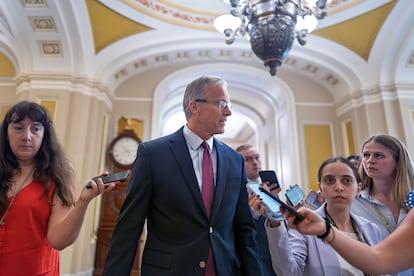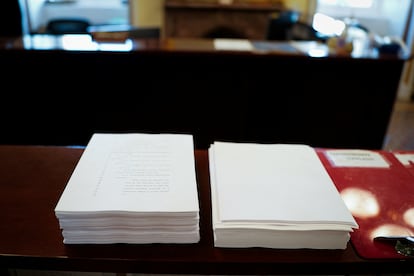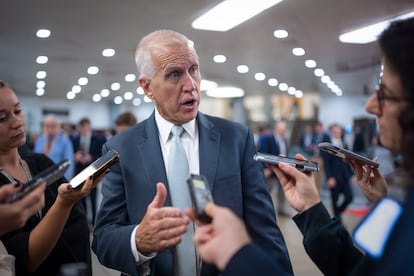Senate narrowly passes Trump’s Big, Beautiful Bill after four days of agonizing debate
The piece of legislation, to which Republicans in the upper house have made numerous changes, now goes back to the House, where quick passage is not a given


The phrase by former House Speaker Nancy Pelosi is famous in Washington: “We have to pass the bill so that you can find out what is in it.” Last Saturday, Chuck Schumer, the Senate minority leader, reversed the order of events by forcing long-suffering Senate staffers to read aloud in the chamber, for 15 hours, the 940-page revised version of the controversial “Big, Beautiful Bill,” published shortly before midnight on Friday. The sweeping text—which encapsulates Donald Trump’s ambitious tax reform and spending proposal and threatens to greatly increase an already out-of-control public deficit—was finally approved on Tuesday after four days of agonizing debate on Capitol Hill, and only thanks to the tie-breaking vote from Vice President J. D. Vance. The final vote was 51-50.
The “One Big Beautiful Bill” (BBB), a name that could only have come from the current president of the United States, is the piece of legislation on which Trump relies for the success of his domestic economic agenda, hence his impatience to sign it. For months, he has pressured his fellow Republicans on Capitol Hill to bite the bullet in the face of the cuts to the safety net that will affect their constituents, and now he wants it on his desk before the 4th of July.
It seems unlikely to happen: after the Senate’s approval, the bill now moves back to the House, where it was approved in May by a single vote (215-214). And the drama shows no signs of letting up. The text has changed so much along the way that it must be debated again, and several members of the hardline wing of the Republican Party, traditionally opposed to increased public spending, are already threatening not to support it.
In the Senate, all the Democrats (47), along with two dissident Republican senators - Rand Paul (Kentucky) and Thom Tillis (North Carolina) - voted against the BBB, a law that deepens the tax cuts approved in 2017 at the beginning of the first Trump Administration, fulfills campaign promises such as the elimination of taxes on tips, and allocates hundreds of billions of dollars to his mass deportation plan, as well as to the current Administration’s priorities in terms of defense.
The bill seeks to offset such spending with, among other things, cuts worth more than €900 billion to Medicaid, a welfare system for the lowest-income earners and people with disabilities, and to the SNAP program, the current name for the food stamp distribution system. But even this won’t be enough: according to calculations by the Congressional Budget Office, the BBB will add some €3.3 trillion over the next 10 years to the U.S. deficit, which currently stands at €37 trillion, a record high since the Covid pandemic.
Among the changes made to the bill during its time in the Senate are the creation of a $25 billion fund for rural hospitals and the elimination of exemptions for wind and solar projects, a flagship measure of the previous administration.
The live reading gave way on Monday to something called the Vote-o-Rama, a marathon session in which the text is reviewed one last time and proposals for changes are made, which are either approved or rejected. This time it lasted about 26 hours, until the news broke that Senate Majority Leader John Thune (South Dakota) had gathered the necessary votes after a hectic night.
Discounting support from Paul, who opposed the BBB from the outset, and Tillis, who rejected changes to Medicaid that will leave 12 million people without coverage, all eyes turned to the undecided. Above all, to Alaska Senator Lisa Murkowski, who was courted while she obtained benefits and exceptions for her own state. But they also kept an eye on Senators Susan Collins (Maine) and Josh Hawley (Missouri), who had flirted with an opposition that ultimately failed to materialize.

These attempts at public rebellion were part of a spectacle that was pure Washington. The reading of the 940 pages of the bill on Sunday morning offered images that seemed like the epic-free reverse of the Washington myth of James Stewart, who droned on and on in Frank Capra’s classic of political idealism, Mr Smith Goes To Washington (1939). A handful of long-suffering Senate employees took turns performing the task while their colleagues, fidgeting in their seats, stared blankly ahead, perhaps reviewing next week’s to-do list or ranking Nicolas Cage’s performances from best to worst.
At night, while the senators’ staffers (in Capitol Hill slang, a tribe of workers exploited in the name of a mix of ambition and patriotism) called home to tell their families not to wait up for them, news reporters filed the same story over and over again and struggled to maintain the suspense, while the food delivery people headed for the Capitol.
Elon Musk, meanwhile, made a cameo appearance: the richest man in the world, with his own history of criticizing the bill for its effects on the public deficit, tweeted on X on Saturday afternoon that he found the content of the reworked bill “utterly insane.”
Trump, for his part, didn’t miss the opportunity. In a message on Truth, he suggested applying scrutiny and cuts to the Department of Government Efficiency (DOGE), which the president had previously appointed Musk to head with the task of streamlining the administration. He also threatened his former “first buddy” with ending subsidies for his companies, which are heavily dependent on public funds.

Earlier this weekend, the U.S. president had canceled his favorite weekend plans—a golf trip at one of his clubs, in Bedminster, New Jersey—so he could spend Saturday calling senators and pressuring them to pass the bill as soon as possible. It’s the new law of the Republican Party these days: anyone who dares to oppose the leader exposes themselves to his fury and the risk of seeing him unleash his forces against them. Anticipating this, Tillis, the North Carolina senator, announced on Sunday that he would not run for reelection, which was due next year. Once he had that weight off his chest, he became the president’s biggest critic during the four days of Senate negotiations on the bill, denouncing in a speech on the Senate floor the “hypocrisy of American politics” and those who will do anything to hold on to their seats.
Sign up for our weekly newsletter to get more English-language news coverage from EL PAÍS USA Edition
Tu suscripción se está usando en otro dispositivo
¿Quieres añadir otro usuario a tu suscripción?
Si continúas leyendo en este dispositivo, no se podrá leer en el otro.
FlechaTu suscripción se está usando en otro dispositivo y solo puedes acceder a EL PAÍS desde un dispositivo a la vez.
Si quieres compartir tu cuenta, cambia tu suscripción a la modalidad Premium, así podrás añadir otro usuario. Cada uno accederá con su propia cuenta de email, lo que os permitirá personalizar vuestra experiencia en EL PAÍS.
¿Tienes una suscripción de empresa? Accede aquí para contratar más cuentas.
En el caso de no saber quién está usando tu cuenta, te recomendamos cambiar tu contraseña aquí.
Si decides continuar compartiendo tu cuenta, este mensaje se mostrará en tu dispositivo y en el de la otra persona que está usando tu cuenta de forma indefinida, afectando a tu experiencia de lectura. Puedes consultar aquí los términos y condiciones de la suscripción digital.








































